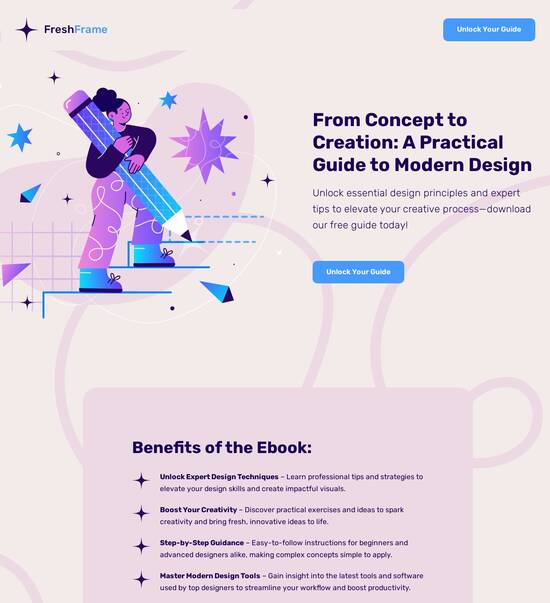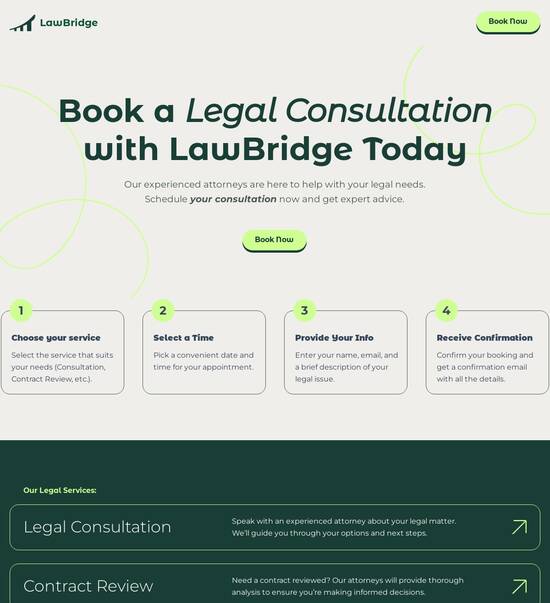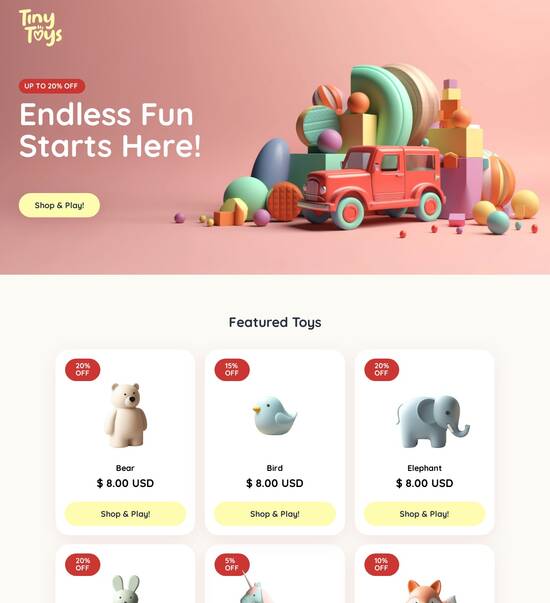
HTML page template with interactive announcement pop-up
Explore Similar TemplatesAbout template
Use HTML page templates with interactive announcement pop-up and make your communications easy and transparent. Try our solution today.
Recommended templates

Easy to build without coding
With the intuitive drag-and-drop builder, anyone on your team can create high-converting pages without any knowledge of code or design. Make enhancements to your landing page with custom widgets using Javascript, HTML/CSS, or third-party scripts.

Multiple layouts for any industry and goal
Select from 500+ landing page layouts built to boost conversions across industry-specific scenarios. Customize them by adjusting fonts, adding images, and generating on-brand content with the AI assistant. Quickly scale with Instablocks® and Global Blocks that you can save, reuse, and update globally.

Loads fast and looks polished on any device
Every template is responsive, which means they present professionally on any device and load blazingly fast with our Thor Render Engine. You can also power them up with Google AMP technology to deliver an unparalleled mobile experience and drive higher conversions.

Robust analytics & experimentation
Get real-time updates and reporting across all your devices, showing the number of visitors, conversions, cost-per-visitor, and cost-per-lead. Launch AI-powered experiments, run A/B tests, and use heatmaps to analyze user behavior, then optimize your landing page to maximize conversions.







Easy to build without coding
With the intuitive drag-and-drop builder, anyone on your team can create high-converting pages without any knowledge of code or design. Make enhancements to your landing page with custom widgets using Javascript, HTML/CSS, or third-party scripts.
Multiple layouts for any industry and goal
Select from 500+ landing page layouts built to boost conversions across industry-specific scenarios. Customize them by adjusting fonts, adding images, and generating on-brand content with the AI assistant. Quickly scale with Instablocks® and Global Blocks that you can save, reuse, and update globally.
Loads fast and looks polished on any device
Every template is responsive, which means they present professionally on any device and load blazingly fast with our Thor Render Engine.
Robust analytics & experimentation
Get real-time updates and reporting across all your devices, showing the number of visitors, conversions, cost-per-visitor, and cost-per-lead. Launch AI-powered experiments, run A/B tests, and use heatmaps to analyze user behavior, then optimize your landing page to maximize conversions.
All the features you need to build website announcement template
Explore more featuresLearn how to build anouncement popup
Frequently asked questions about announcement popups
Leading the way in building high-performing landing pages





Templates for homepage announcements: Your ultimate how-to guide
If you're looking to elevate your digital marketing campaigns, leveraging Instapage's HTML page template with interactive announcement pop-up can significantly enhance user engagement and conversion rates. Hosting your campaigns on a robust platform like Instapage allows you to utilize high-converting templates that are not only aesthetically pleasing but also optimized for performance. This guide provides a step-by-step approach to creating effective landing pages that resonate with your audience.
Understanding the Basics of HTML Page Templates
An HTML page template serves as a pre-designed layout that allows marketers to infuse their brand elements while ensuring usability and functionality. With Instapage, you gain access to over 100 templates specifically designed for high conversion rates. The combination of streamlined design and strategic placements results in increased lead generation and a strong return on investment for your campaigns.
- Responsive design: Ensures that your page looks great on all devices, enhancing user experience.
- SEO optimization: Built-in features assist with higher rankings on search engines.
- Customizable elements: Modify layouts, text, and images easily to fit your branding needs.
Step 1: Choose an Appropriate Template
To create your HTML page, start by selecting a template that mirrors your campaign's goals. Instapage offers flexible templates tailored to different marketing verticals, including tech/SaaS, education, and financial services. Review the templates and choose one that aligns closely with your audience's preferences.
Step 2: Customize with Interactive Announcement Pop-ups
Once your template is selected, you can enhance user interaction by adding an interactive announcement pop-up. This feature allows for timely notifications and updates without interrupting the user experience.
- Engagement: Pop-ups can grab attention effectively when placed strategically.
- Personalization: Tailor messages based on user behavior to increase relevancy.
- Analytics tracking: Gather data on how users interact with your announcements for future optimization.
Step 3: Optimize and Test Your Page
Optimization is critical to ensuring your HTML page converts visitors into leads. Utilize Instapage's built-in A/B testing features to experiment with different headlines, call-to-action buttons, and images. Pay attention to heatmaps to analyze user behavior and adjust elements accordingly.
- A/B Testing: Test different versions of your content to find the most effective approach.
- Analytics Dashboard: Keep track of page performance metrics in real-time.
- User Feedback: Consider integrating user surveys post-visit to gather insights.
In conclusion, developing an effective HTML page template with interactive announcement pop-up on Instapage facilitates a seamless user journey that can boost your campaign's conversion potential. By leveraging the power of customizable templates and optimization tools, marketers can achieve substantial improvements in their digital marketing strategies.
Get started today with Instapage's extensive resources and unlock the full potential of your marketing campaigns. Create high-converting pages that engage your viewers and maximize your ROI.
People also ask about landing pages templates announcement
Creating an HTML page template with an interactive announcement pop up
The evolution of HTML page templates and interactive features
HTML page templates have come a long way since the early days of web development. Initially, web pages were simple and static, primarily serving as online brochures. Designers relied on basic HTML tags to structure pages, focusing on content rather than user experience. As web technologies evolved, so too did the complexity and functionality of these templates, paving the way for more sophisticated design elements.
With the introduction of CSS and JavaScript, web design began to embrace interactive elements. The shift from purely static to interactive pages allowed designers to engage users more effectively. This transition was crucial for enhancing user experience, leading to the development of features such as forms, sliders, and interactive menus, which increased site interactivity.
In modern web design, announcement popups have emerged as a standard feature, serving as a vital communication tool for websites. These popups allow marketers and site owners to convey important messages, promotions, or updates directly to their audience, effectively grabbing attention and driving interactions.
Understanding the announcement popup: definition and purpose
An announcement popup is an overlay that appears on a user's screen to share important information without disrupting their browsing experience. These popups can contain messages about new product launches, limited-time offers, or organizational updates, aiming to inform users while encouraging engagement.
Unlike standard popups that can often be intrusive and annoying, announcement popups are designed with user experience in mind. They are typically more visually appealing and offer valuable content. Their primary goal is to inform users without detracting from the overall user experience.
Some common functionalities include: - Prominent visibility for announcements - User engagement through calls-to-action - Ability to close or dismiss the message easily. Common use cases include promoting sales, gathering email sign-ups, or providing important service updates.
The design aesthetics: creating visually appealing announcement popups
The effectiveness of an announcement popup is significantly influenced by its design. A visually appealing popup captures attention and motivates user interaction. Selecting the right colors that complement the website’s background can help maintain a cohesive look while making the popup stand out. For instance, if a website features a light background, darker or vibrant colors for the popup can enhance visibility.
Typography also plays a crucial role; clear and legible text ensures that the message is easily digestible. Using a combination of imagery or icons can add flair and convey messages more effectively. Remember, the goal is to maintain engagement without overwhelming the user.
Another critical aspect is ensuring your popups are responsive. With numerous devices accessing the web, popups must adjust to various screen sizes. Crafting a responsive design means users experience the same quality of content on desktops, tablets, or smartphones, ensuring information is preserved across platforms.
Coding your announcement popup: a step-by-step guide
Creating an announcement popup involves a few straightforward steps. Start with the basic structure of an HTML document. Essential HTML elements include the div for the popup itself, a header for content, and a close button to dismiss it. Here’s a brief outline of the structure needed:
HTML container for the popup
Header for message display
Close button for exiting the popup
Next, integrate CSS for styling. Styling should focus on visibility, employing aspects like background color, border, and padding to enhance the aesthetic of the popup. An example CSS snippet could define the width, height, and positioning of the popup.
To make the popup functional, incorporate JavaScript for interaction. Basic mechanics for display can involve showing the popup upon a specific event, such as page load or a button click. Event listeners will allow you to monitor user interaction, providing insights into engagement. An example code might include functions to show or hide the popup based on user actions.
Enhancing user experience: actions and accessibility
User-friendly design principles are crucial for popups. Consider the timing and frequency of appearing announcements to avoid overwhelming users. Popups should appear at logical points in the user journey, ensuring they add value rather than annoyance. For example, showing a popup after a user spends a few moments on a webpage can be more effective than a sudden interruption.
Ease of use remains fundamental; providing explicit close options ensures users feel in control. Additionally, accessibility is essential to integrate into your popups. Implementing ARIA roles and attributes helps assistive technologies interpret the content correctly, enhancing user experience for those with disabilities.
Moreover, enabling keyboard navigation allows users to interact with the popup using keyboard shortcuts, catering to a broader audience. With thoughtful design and accessibility features, you can create an inclusive and engaging experience that respects all users.
The power of popups: perks of using announcement popups
Leveraging announcement popups provides numerous advantages for engaging website visitors. One significant benefit is increased visibility for essential updates or promotions. In a crowded digital space, a well-timed and designed popup can grab user attention more effectively than traditional static messaging.
By boosting user engagement, these popups can prompt interactions, guiding users toward desired actions, such as signing up for newsletters or exploring new products. Furthermore, effectively crafted messaging can drive conversions by presenting targeted offers aligned with user interests.
Utilizing announcement popups strategically allows marketers to communicate pertinent information directly, creating a robust platform for user engagement that drives results.
Integrating the announcement popup: synchronization capabilities with existing platforms
Successful integration of announcement popups extends beyond simple implementation. Syncing with email marketing tools allows you to collect user data and target specific segments effectively. By integrating with customer relationship management (CRM) systems, businesses can track interactions and analyze user behavior, providing a bridge between engagement and sales strategies.
Additional integration with analytics platforms offers insights into popup performance, helping marketers make informed decisions based on users’ responses. Case studies illustrate successful strategies in leveraging synchronization; for instance, e-commerce sites have employed popups for abandoned cart reminders, syncing with their email campaigns to close sales more effectively.
These capabilities illustrate the importance of holistic approaches to managing announcement popups, ensuring they serve as integral components of broader marketing strategies.
Data-driven popups: leveraging knowledge for optimal performance
Utilizing data and analytics plays a pivotal role in optimizing the effectiveness of announcement popups. By understanding user behavior through analytics, marketers can tailor messages and design based on insights gained from user interactions. Tracking metrics such as click-through rates and user engagement with popups provides a clear picture of how content is performing.
Another effective strategy lies in A/B testing different designs and messaging. This method allows marketers to compare variations and determine what resonates best with their audience, leading to improved performance over time. Key metrics to track include conversion rates, time on page, and dismissal rates, all of which help guide decisions on popup adjustments.
Data-driven decision-making ensures that announcement popups evolve based on real user feedback, enhancing both effectiveness and user experience.
Best practices and guidelines for implementing announcement popups
Implementing announcement popups effectively involves adhering to best practices and guidelines. One critical area involves timing strategies; determining the optimal moments to display popups can significantly impact user acceptance. For instance, showing a popup after a user has engaged with content for a set duration may yield better results compared to interrupting them immediately upon entry.
Personalizing content further tailors user experiences. By segmenting audiences based on behavior or preferences, marketers can develop unique messages that resonate with specific groups. Avoiding common pitfalls is also essential; overusing popups can lead to frustration, prompting users to leave the site. Ensuring mobile optimization also cannot be overlooked, as many users navigate the web via mobile devices.
Future trends in announcement popups and interactive web features
As web technologies evolve, the role of AI and machine learning in customizing announcement popups is on the rise. These innovations empower marketers to deliver personalized content based on real-time data, essentially guiding users through tailored experiences. The demand for interactivity and personalization is likely to shape the next generation of web features, providing more dynamic user interactions.
Balancing user experience with marketing effectiveness remains a key consideration in evolving strategies. Incorporating user feedback to refine engagement tactics will prove vital in ensuring that interactive elements enhance rather than detract from the website experience.
Real-world applications: enhancing websites with interactive announcement popups
The application of interactive announcement popups varies across industries, providing unique examples of effective usage. In e-commerce, for instance, popups can be used to present promotions or limited-time offers, enticing visitors with time-sensitive deals. Similarly, nonprofits leverage popups to communicate about fundraising events or awareness campaigns, engaging users in their mission.
Blogs can also benefit from announcement popups, using them to notify readers about new posts or encourage newsletter sign-ups with exclusive content. Each of these applications illustrates the potential of popups in enhancing user engagement and driving conversions through targeted strategies.
Lessons learned from successful campaigns highlight the importance of thoughtful design and targeted messaging in maximizing the impact of these popups.
Final thoughts: the impact of interactive features on web engagement
The rise of interactive elements, especially announcement popups, has transformed how websites engage with users. These features allow for direct communication and provide valuable information without disrupting the browsing experience. By focusing on thoughtful design and user-centric content, marketers can create engaging digital environments that foster loyalty and improve conversion rates.
Looking ahead, encouraging ongoing innovation and experimentation in how websites interact with users will ensure relevancy in an ever-evolving digital landscape. Embracing new technologies and strategies will help craft more engaging user experiences, positioning brands for sustained success.
Ready to skyrocket conversions?
Supercharge your ad campaigns with high-performing landing pages
Get started














